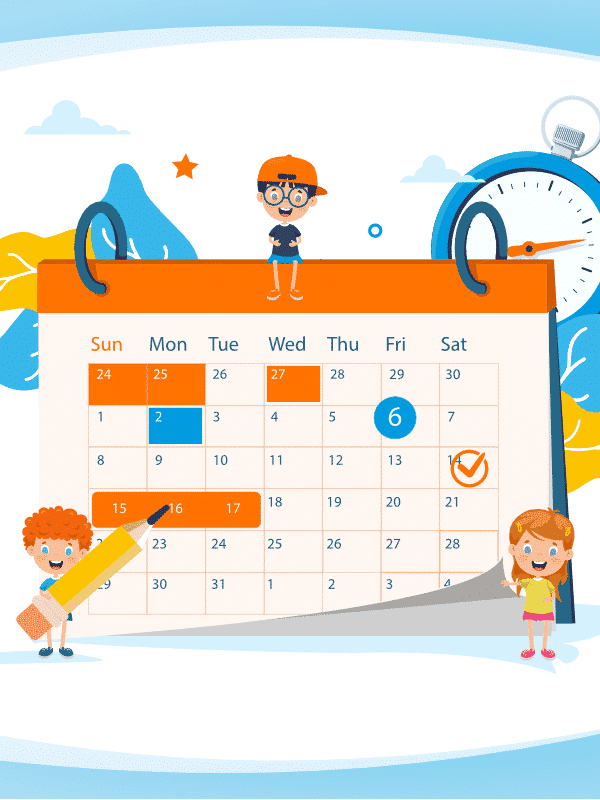Happy summer holidays! One of the coolest times of the year has finally arrived: Summer. Adults always count the days for this moment, but the kids are probably the most excited. Because it means they finally get a break from school and studying. Plus, it’s traveling season.
Many families go on vacation somewhere beautiful. So tell us, where are you going this year? Mexico? Greece? Puerto Rico? Honestly, no matter which school break you’re in. Maybe it’s spring break, maybe it’s summer, maybe it’s Christmas… All are great for traveling.
And traveling is the perfect excuse for kids to learn and practice some Spanish. Not only because many people go to a Hispanic country, so their children will acquire some vocabulary. But also because they can make friends talking in Spanish about the places they’ve visited. It’s an interesting conversation topic for all moments.
So, are you ready to learn the phrase “has viajado…?” It’s the perfect question to start a conversation and make some friends talking about trips. Let’s go!
Spanish Words in Today’s Lesson
Here are some words in Spanish we’ll learn in today’s lesson. These are very common, so it would be good if your kids could learn them:
- Viajar – Travel
- Viajado – Traveled
- Tú – You
- México – Mexico
- Italia – Italy
- Barcelona – Barcelona
- Nueva York – New York
- Avión – Airplane
- Metro – Subway
- Train – Tren
- Coche – Car
- Camión – Bus
- Barco – Boat / Ship
- Ferri – Ferry
- Helicóptero – Helicopter
- Primavera – Spring
- Verano – Summer
- Otoño – Autumn / Fall
- Invierno – Winter
- Solo – Alone
- Esposa – Wife
- Amigos – Friends
- Perro – Dog
- Hermoso – Beautiful
- Equipaje – Luggage
Questions and Answers with “¿Has viajado…?”
First you must know that “¿Has viajado…?” means “Have you traveled…?”
The complete sentence would include a “tú” (you). So “¿Tú has viajado…?” But in Spanish we can omit the personal pronoun, as the question is still understandable.
You can complete this question with the name of certain countries, states, cities… For example:
- ¿Has viajado a México? / Have you traveled to Mexico?
- Sí, he viajado a México. / Yes, I’ve traveled to Mexico.
- No, no he viajado a México. / No, I haven’t traveled to Mexico.
- ¿Has viajado a Italia? / Have you traveled to Italy?
- Sí, he viajado a Italia muchas veces. / Yes, I’ve traveled to Italy many times.
- No, no he viajado a Italia nunca. / No, I have never traveled to Italy.
- ¿Has viajado a Barcelona? / Have you traveled to Barcelona?
- Sí, he viajado a Barcelona dos veces. / Yes, I’ve traveled to Barcelona twice.
- No, no he viajado a Barcelona. / No, I haven’t traveled to Barcelona.
- ¿Has viajado a Nueva York? / Have you traveled to New York?
- Sí, he viajado a Nueva York y es hermoso. / Yes, I’ve traveled to New York and it’s beautiful.
You can also use it to ask the way they’ve traveled, like the means of transportation someone has used. For example:
- ¿Has viajado en avión? / Have you traveled by plane?
- Sí, he viajado en avión. / Yes, I’ve traveled by plane.
- No, no he viajado en avión. / No, I haven’t traveled by plane.
- ¿Has viajado en metro? / Have you traveled in the subway?
- Sí, he viajado en metro muchas veces. / Yes, I’ve traveled in the subway many times.
- No, no he viajado en metro nunca. / No, I have never traveled in the subway.
- ¿Has viajado en tren? / Have you traveled by train?
- Sí, he viajado en tren y da miedo. / Yes, I’ve traveled by train and it’s scary.
- No, no he viajado en tren, pero no quiero. / No, I haven’t traveled by train, but I don’t want to.
- ¿Has viajado en coche? / Have you traveled by car?
- Now, you try to answer this one. Tell us if you’ve traveled by car.
- ¿Has viajado en camión? / Have you traveled by bus?
- Now, you try to answer this one. Tell us if you’ve traveled by bus.
- ¿Has viajado en barco? / Have you traveled by boat?
- Now, you try to answer this one. Tell us if you’ve traveled by boat.
- ¿Has viajado en ferri? / Have you traveled by ferry?
- Now, you try to answer this one. Tell us if you’ve traveled by ferry.
- ¿Has viajado en helicóptero? / Have you traveled by helicopter?
- Now, you try to answer this one. Tell us if you’ve traveled by helicopter.
It can also be used with seasons. It’s always interesting to see in which time of the year someone has traveled, as countries change with seasons. For example:
- ¿Has viajado en verano? / Have you traveled in summer?
- Sí, he viajado en verano. / Yes, I’ve traveled in the summer.
- No, no he viajado en verano. Sólo he viajado en otoño. / No, I haven’t traveled in the summer. I’ve only traveled in autumn.
- ¿Has viajado en invierno? / Have you traveled in winter?
- Sí, he viajado en invierno. / Yes, I’ve traveled in winter.
- No, no he viajado en Invierno. Sólo he viajado en primavera. / No, I haven’t traveled in winter. I’ve only traveled in spring.
You can also use this question to ask about the company that someone has traveled with. Now you try to answer these next questions with what you’ve learned above. For example:
- ¿Has viajado solo? / Have you traveled alone?
- ¿Has viajado con tu esposa? / Have you traveled with your wife?
- ¿Has viajado con tus amigos? / Have you traveled with your friends?
- ¿Has viajado con tu perro? / Have you traveled with your dog?
It can also be used to ask other ways people have traveled. Like with how much luggage or by which airline. Try to answer these next questions by yourself. For example:
- ¿Has viajado con mucho equipaje? / Have you traveled with a lot of luggage?
- ¿Has viajado por American Airlines? / Have you traveled with American Airlines?
And of course, you can simply ask the question as it is. Try to answer these next questions with what you’ve learned so far. For example:
- ¿Has viajado? / Have you traveled?
- ¿Has viajado mucho? / Have you traveled much?
- ¿Has viajado mucho últimamente? / Have you traveled much lately?
Conquer the World with Your Spanish Skills
Your kids just learned one of the best questions to start a conversation about traveling. And different ways of using that question to ask their classmates or friends about their trips. That’s awesome!
But are they ready to conquer the world with their Spanish skills? There’s still a lot they can learn to impress native Spanish speakers and make some friends around the world. We can help.
TruFluency Kids offers Spanish classes with native teachers! So you can be sure your children will learn useful things they’ll actually get to apply in real life.
We also teach through fun activities. Kids will sing, dance, do crafts, play games, and even cook. All in complete Spanish! This way they’ll have fun, while acquiring the language in a natural and casual way.
As if that weren’t enough, we encourage speaking in Spanish. So who knows? Maybe they’ll even talk about their trips and use the question they just learned. This is the best way they’ll achieve Spanish fluency.
Take a 30-minute trial class now You’ll get to participate in a parent Q & A after the class, so we can answer all your questions.


